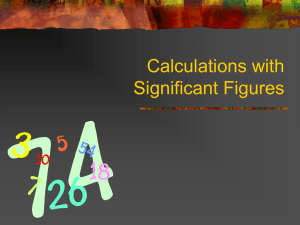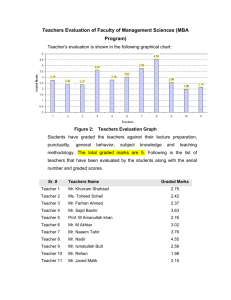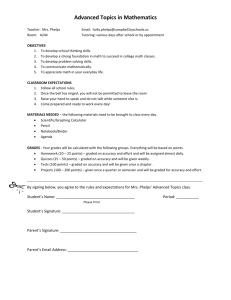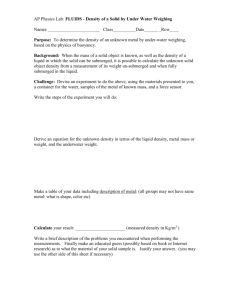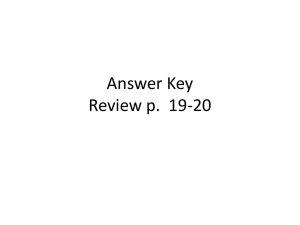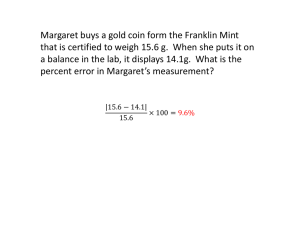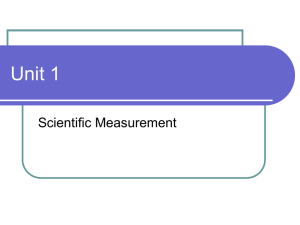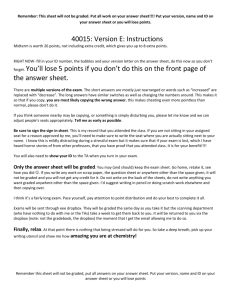Only the answer sheet will be graded
advertisement
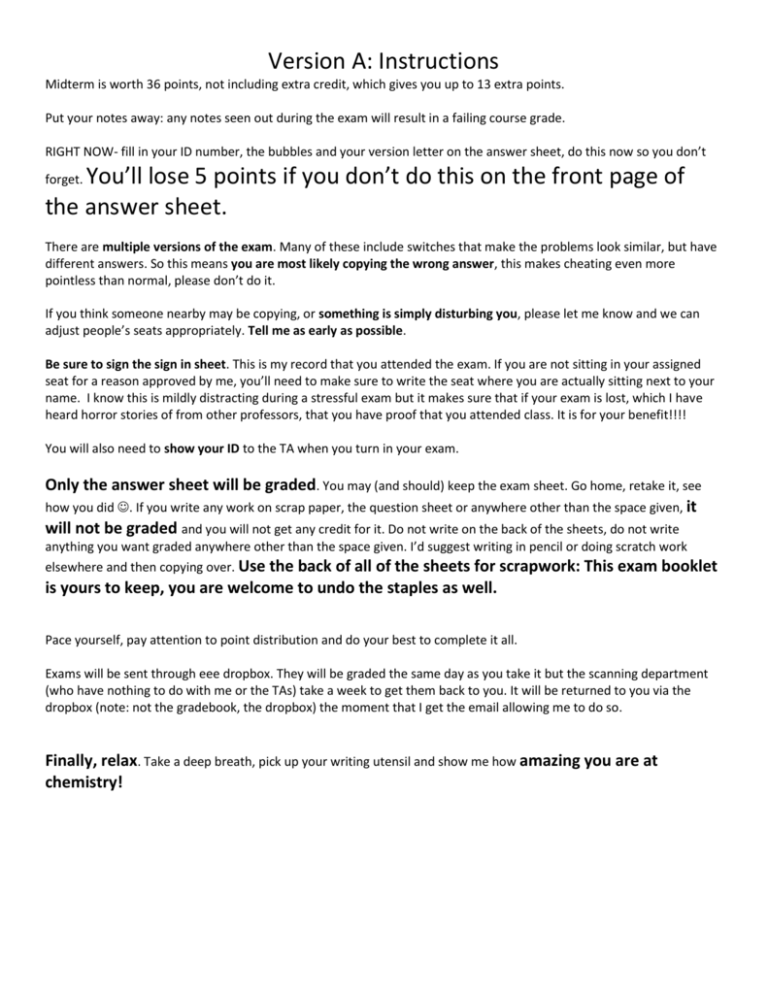
Version A: Instructions Midterm is worth 36 points, not including extra credit, which gives you up to 13 extra points. Put your notes away: any notes seen out during the exam will result in a failing course grade. RIGHT NOW- fill in your ID number, the bubbles and your version letter on the answer sheet, do this now so you don’t You’ll lose 5 points if you don’t do this on the front page of the answer sheet. forget. There are multiple versions of the exam. Many of these include switches that make the problems look similar, but have different answers. So this means you are most likely copying the wrong answer, this makes cheating even more pointless than normal, please don’t do it. If you think someone nearby may be copying, or something is simply disturbing you, please let me know and we can adjust people’s seats appropriately. Tell me as early as possible. Be sure to sign the sign in sheet. This is my record that you attended the exam. If you are not sitting in your assigned seat for a reason approved by me, you’ll need to make sure to write the seat where you are actually sitting next to your name. I know this is mildly distracting during a stressful exam but it makes sure that if your exam is lost, which I have heard horror stories of from other professors, that you have proof that you attended class. It is for your benefit!!!! You will also need to show your ID to the TA when you turn in your exam. Only the answer sheet will be graded. You may (and should) keep the exam sheet. Go home, retake it, see how you did . If you write any work on scrap paper, the question sheet or anywhere other than the space given, it will not be graded and you will not get any credit for it. Do not write on the back of the sheets, do not write anything you want graded anywhere other than the space given. I’d suggest writing in pencil or doing scratch work elsewhere and then copying over. Use the back of all of the sheets for scrapwork: This exam booklet is yours to keep, you are welcome to undo the staples as well. Pace yourself, pay attention to point distribution and do your best to complete it all. Exams will be sent through eee dropbox. They will be graded the same day as you take it but the scanning department (who have nothing to do with me or the TAs) take a week to get them back to you. It will be returned to you via the dropbox (note: not the gradebook, the dropbox) the moment that I get the email allowing me to do so. Finally, relax. Take a deep breath, pick up your writing utensil and show me how amazing you are at chemistry! Long Answers: 1 A) Balance the following reaction in an acidic solution and then balance it in a basic solution. to plate the piece that needs protection. The electroplated metal then acts as a sacrificial anode protecting the underlying metal. Bonus: increases conductivity of water surrounding reaction. 4) Using the given data, solve for the rate law. (hint: don’t forget to solve for the value of K) A+B→C+D Rate=1.46 1/sM2[B]2[A] B) Balance the following reaction in an acidic solution. (hint: I highly suggest NOT using half reactions) 5) Explain the methods we can use to increase the rate of reaction. List at least three and describe how they work. Catalysis: lowers activation energy Temperature: increases frequency and energy of collisions Concentration: increases frequency of collisions. Short Answer: The following redox reaction is used in acidic solution in the breathalizer test to determine the level of alcohol in the blood: Use it to answer the following questions. 2) The diagram below shows a spontaneous cell comprised of Ag/Ag+ half cell and a Cu+/Cu half cell with a KNO3 salt bridge. Label each letter with the chemical species present. What will the voltmeter read? A)Cu B) Cu1+ C)KNO3 D) Ag E)Ag1+ Volt) 3.82 3) What is one way to prevent corrosion? Explain how this process occurs? Bonus Question (for up to two extra points): Why does salt (such as from the ocean or from application on icy roads) increase corrosion? You can galvanize the metal with another metal like Zinc which has a lower reduction potential. You use electrolysis 1) Which atom is being oxidized? Te or Clo32) Which atom is being reduced? Cl3) What is the reducing agent? Te 4) What is the oxidizing agent? ClO3--------------------------------------------- Use the equation above to answer the questions below 5) Write the oxidation half reaction Cu(s) Cu2+(aq)+2e6) Write the reduction half reaction Ce4+(aq)e- + Ce3+(aq) 7) Which electrode will have a lower mass after the reaction has completed? Cu 8) What is the Eocell? 1.38V ------------------------------------------------- 9) Find the Eocell of the galvanic cell composed of the Ag+(aq)/Ag(s) and Cu2+(aq) /Cu(s) half reactions. 0.46V 10) Find the Eocell of the electrolytic cell composed of the Ag+(aq)/Ag(s) and Cu2+(aq) /Cu(s) half reactions. -0.46V Calculate the average rate of reaction during the time period from 0-125 seconds. 11) Determine the time in hours required to electroplate 7.00g of magnesium metal from molten magnesium chloride, by using a current of 7.30 A.? 7.6x10-4 M/s 2.12 hours 12) For a first order reaction, identify the missing axis label. 16) What is the unit of k in the rate law of a 0st order reaction? M/s 17) What is the unit of k in the rate law of a 2nd order reaction? 1/sM Ln(A) 13) For a first order reaction, identify the missing axis label. 18)The rate constant for this first order reaction is 0.440 s-1. How long would it take for the concentration of A to decrease from 0.600M to 0.210M? (sig figs will be graded) 2.39sec 19) The rate constant for this first order reaction is 0.0210 s-1. After how many seconds will 20.1% of the reactant remain? A→products. (sig figs will be graded) 76.4sec [A] 14) The rate of the following reaction is 0.254 M/s : A+2B 3C. What is the rate of formation of C? (sig figs will be graded) 0.762 M/s 15) The decomposition of N2O5 can be described by the equation: (sig figs will be graded) 20) Identify the order of the reaction given the following information: A twofold increase in the initial concentration of A leads to a fourfold increase in the initial rate. 2nd 21) Identify the order of the reaction given the following information: The rate of decrease of [A] is constant. 0th 22) Determine the rate law for the overall reaction given the following mechanism. Rate=[A][B] 23) Hydrogen peroxide decomposes spontaneously to yield water and oxygen gas. The activation energy for this is 75 kJ/mol but in the presence of a metal catalyst the activation energy is lowered to 49kJ/mol. At what temperature would the non- catalyzed reaction need to be run to have an equal rate to that of the metal catalyzed reaction at 25oC. 460 ************************************ 24) Which species is an intermediate? AB 25) Which species is a catalyst? B 26) What is the molecularity of step 1? bimolecular **********************************************
